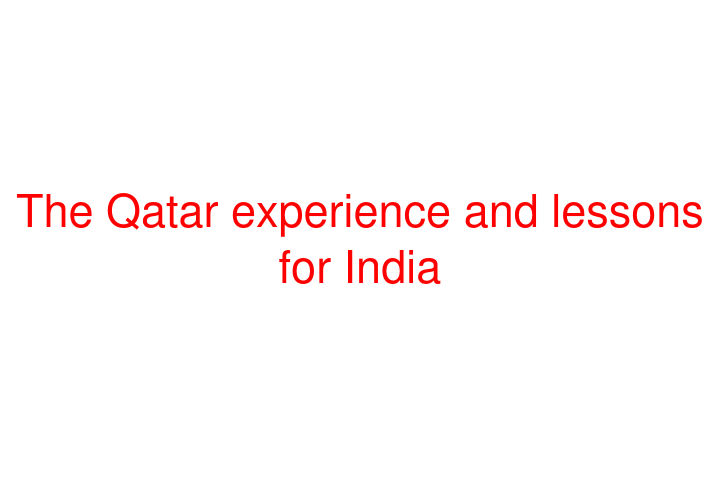 By Siddhartha Upadhyay
By Siddhartha Upadhyay
The world is changing. Sport is a strong vehicle of change. And one of the best examples of this phenomenon is Qatar, which is on the fast track of modernisation and transformation ever since it clinched the right to host the 2022 FIFA World Cup. This is the first time that a mega sporting event of this proportion is being hosted in this part of the world.
Qatar has been at it for a long time. Finally, its protracted struggle bore fruit. Any sportsperson would vouch for this; nothing succeeds like success. Qatar has suddenly catapulted itself in the world of sports as a shining star. All the reservations like the regressive labour laws, poor human rights record, curbs on free speech and lack of integrated sports culture -- all of these factors, individually and collectively -- were sufficient to defeat Qatar's claim to host the World Cup.
There's also a raging controversy about how Qatar secured the bid. But Qatar won the bid in spite of all these hurdles. That Qatar won the bid, in my view, is simply historic.
The whole country is in a transformation mode, like a snake that sheds its old skin and emerges with a new one. I was in Qatar earlier this year and the change -- and the pace of that change -- is both bewildering and inspiring.
It's estimated that more than $250 billion will be spent to prepare for the World Cup. New stadia and arenas are coming up, civic infrastructure is being upgraded manifold; hotels, railways, airports and freeways are fast transforming the country. One cannot escape the feeling that these changes are symbolic of the ambitions of a small country to make it big in the comity of nations.
Development and social justice via sports is the vision of Prime Minister Narendra Modi as well. India has much to learn from the Qatar experience. Just to give you an idea, there will be seven host cities -- Al-Daayen, Al-Khor, Al-Rayyan, Al-Shamal, Al-Wakrah, Doha and Umm Slal -- where 12 new state-of-art stadia will come up with capacities of at least 43,000 each. And the unique aspect is that part of these stadia could be dismantled after the event and transported to other less-developed countries to help set up the infrastructure for sports and encourage people at large to play.
Qatar, while creating a real estate marvel, will remain conscious of environmental consequences. Most of the sporting infrastructure being built is zero-carbon emitting and climate controlled.
Qatar's success is not confined to just winning the bid to host the World Cup, but its commitment to modernising and upgrading its economy. An event of this magnitude is not just about creating the necessary sporting infrastructure in a stipulated time frame, but the emphasis is also on developing and internalising an enduring sporting culture in the two-and-a-half-million Qataris. To be able to do that, Qatar is already hosting almost 100 events every year in various sporting disciplines. The World Cup is not the end, but a means to an end.
Last month, Qatar Financial Centre (QFC) Chief Executive Yousuf Mohamed al-Jaida, speaking in London, elucidated the National Vision 2030 where the investment in sports would be an integral part of a multi-faceted strategy to ensure that economic development is diverse and sustainable. There have been wide-ranging labour reforms to make Qatar an enviable destination for foreign investment. There's a move to end the Kafala system that falls foul of international labour laws by binding an employee to an employer in an almost "slave-like" manner. The Qatari government has also expressed its willingness to introduce a law on minimum wages.
Under the young and dynamic leadership of Hassan Al Thawadi, Secretary General of the Supreme Committee for Delivery & Legacy of Qatar, sports is the catalyst in the region's social and economic development. In a recent address to the UN, Thawadi said: "Events of this stature (the World Cup) can bring billions of people together from every corner of the world. They can serve to accelerate and inspire...in a manner and at a pace that few other initiatives can match. Sport is uniquely equipped to play a significant role in attaining these goals. We are aiming for the stars, our feet are firmly on the ground."
India should not just be committed to ensuring "ease of doing business" in the country, but also "ease of all segments of society to play". Qatar's experience has an encouraging message for India.
(Siddhartha Upadhyay is member of the Governing Body of the Sports Authority of India and Founder of STAIRS, an organisation dedicated to the uplift of sports. The views expressed at personal. He can be contacted at siddhartha@upadhyay.co)
(This story has not been edited by Social News XYZ staff and is auto-generated from a syndicated feed.)
About VDC
Doraiah Chowdary Vundavally is a Software engineer at VTech . He is the news editor of SocialNews.XYZ and Freelance writer-contributes Telugu and English Columns on Films, Politics, and Gossips. He is the primary contributor for South Cinema Section of SocialNews.XYZ. His mission is to help to develop SocialNews.XYZ into a News website that has no bias or judgement towards any.
